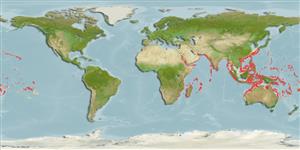Common names from other countries
分类 / Names
俗名 | 同种异名 | Catalog of Fishes(属, 种) | ITIS | CoL | WoRMS | Cloffa
Environment: milieu / climate zone / depth range / distribution range
生态学
海洋 礁区鱼类; 非迁移的; 深度上下限 80 - 370 m (Ref. 5222). 熱帶; 31°N - 31°S, 30°E - 134°W (Ref. 5222)
Indo-Pacific: Red Sea and East Africa to the central Pacific. Epinephelus poecilonotus, Epinephelus radiatus, and Epinephelus tuamotoensis are sometimes referred to as this species.
印度-太平洋: 紅海而且東非到中太平洋。 琉璃石斑魚〔Epinephelus poecilonotus〕 , 雲紋石斑魚〔Epinephelus radiatus〕 與 Epinephelus tuamotoensis 有時被歸屬於這種。
大小 / 重量 / 年龄
Maturity: Lm ? range ? - ? cm
Max length : 90.0 cm TL 雄鱼/尚未辨别雌雄; (Ref. 2871); common length : 60.0 cm TL 雄鱼/尚未辨别雌雄; (Ref. 9137); 最大体重: 6.7 kg (Ref. 40637)
背棘 (总数) : 11; 背的软条 (总数) : 14 - 15; 臀棘: 3; 臀鳍软条: 7 - 8. Distinguished by the following characteristics: head and body tan, with dark brown bands: bifurcate band that begins at rear edge of eye, upper branch extending to a dark brown saddle blotch on the nape just in front of dorsal fin, lower branch running to lower opercular spine and continuing on body as midlateral band that bifurcates above the pectoral fin, upper branch of this band running to a dark blotch at the base of 3rd to 7th dorsal fin rays; dark band from the upper edge of the operculum to base of 5th to 9th dorsal fin spines; narrow band from lower edge of eye to pectoral fin base, continued as broken band along lower part of body and curving up to the dorsal part of peduncle; broad band from maxillary groove to posterior end of interopercle; small dark brown spots often present in the pale areas between bands; depth of body contained 2.8-3.1 times in SL; head length 2.3-2.5 times in SL; flat to moderately convex interorbital area, dorsal head profile slightly convex; shallow indentation on preopercle just above the enlarged serrae at the angle; upper edge of operculum almost straight; maxilla reaches to or past vertical at rear edge of eye; 2 rows of teeth on midlateral part of lower jaw (Ref. 89707).
Found in deep waters from 80-370 m on slopes of islands, sea mounts or continental shelves. Feeds on benthic fishes and large invertebrates (Ref. 89707). Considered rare in Tahiti but quite common in atolls (Ref. 4821). The species is easily confused with E. poecilonotus, E. radiatus, or E. tuamotuensis, three closely related deep-water groupers. Known to be ciguatoxic at Mauritius. Uncommon in local markets (probably due to it deep-water habitat).
被认为是稀有的在大溪地岛中但是相当常见于环礁.(参考文献 4821) 此鱼种容易地被与 E. poecilonotus , E. radiatus 或 E. tuamotuensis ,三个近亲的深水域鲈科鱼类互相混淆。 已知在毛里求斯是有西加毒的。 罕见在地方市场中.(可能由于它深水域栖息地)
Life cycle and mating behavior
Maturities | 繁殖 | Spawnings | Egg(s) | Fecundities | 仔鱼
印度-太平洋: 紅海而且東非到中太平洋。 琉璃石斑魚〔Epinephelus poecilonotus〕 , 雲紋石斑魚〔Epinephelus radiatus〕 與 Epinephelus tuamotoensis 有時被歸屬於這種。
Heemstra, P.C. and J.E. Randall, 1993. FAO Species Catalogue. Vol. 16. Groupers of the world (family Serranidae, subfamily Epinephelinae). An annotated and illustrated catalogue of the grouper, rockcod, hind, coral grouper and lyretail species known to date. Rome: FAO. FAO Fish. Synop. 125(16):382 p. (Ref. 5222)
CITES (Ref. 128078)
Not Evaluated
人类利用
渔业: 低经济; 游钓鱼种: 是的
工具
特别资料
下载 XML
网络资源
Estimates based on models
Preferred temperature (Ref.
115969): 14.2 - 23.1, mean 19 (based on 305 cells).
Phylogenetic diversity index (Ref.
82804): PD
50 = 0.5000 [Uniqueness, from 0.5 = low to 2.0 = high].
Bayesian length-weight: a=0.01318 (0.00806 - 0.02156), b=3.03 (2.90 - 3.16), in cm Total Length, based on LWR estimates for this species & Genus-body shape (Ref.
93245).
营养阶层 (Ref.
69278): 4.0 ±0.65 se; based on food items.
回复力 (Ref.
120179): 中等的, 族群倍增时间最少 1.4 - 4.4年 (Preliminary K or Fecundity.).
Fishing Vulnerability (Ref.
59153): Moderate vulnerability (43 of 100).
Climate Vulnerability (Ref.
125649): Very high vulnerability (86 of 100).
